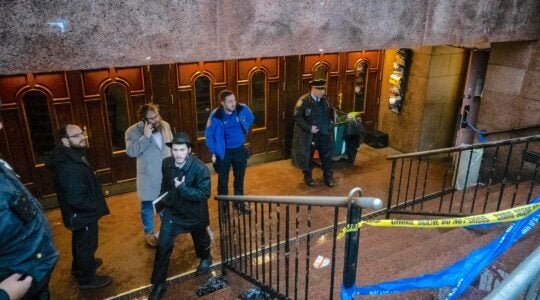JoAnne Page recently recalled a revelatory moment from many years ago at Green Haven Correctional Facility, a maximum-security prison in Dutchess County. She was an 18-year-old volunteer worker, chatting with an inmate, a young man of 20. “He said something I will never forget, that when he was growing up, he was told he’s either going to end up dead or in prison. ‘And now I’m in prison,’ he said, ‘and most of my friends are dead.’”
At a time when national Jewish organizations like the Jewish Council for Public Affairs and the Anti-Defamation League are highlighting the need to reform the criminal justice system and end mass incarceration, it’s worth noting that Page, whose efforts are motivated by her parents’ experiences in Europe during the Holocaust, is marking 30 years as president of The Fortune Society, a New York City-based re-entry organization that helps thousands of former inmates navigate the welfare system and find housing, work and personal reorientation.
The group, based in Harlem and in Long Island City, offers computer tutoring, substance-abuse treatment, cooking classes, job-readiness preparation, remedial education, father- and motherhood programs, mental-health services and employment. The formerly incarcerated make up about 70 percent of the staff.
Seeing graffiti on the walls of Fortune that depicted gravestones with the names of the former inmates’ young friends, Page said she was “drawn back to that first experience at Green Haven. Nothing had changed. As a kid I went to bar mitzvahs. When these clients of ours were kids, they went to funerals. So many of the people I talk to never expected to live past 30.”
Page said she is committed to “giving people a sense of hope of a better future: that’s the issue that really informs my work at Fortune. It’s also why having a critical mass of formerly incarcerated people is so important,” showing inmates there is life beyond the age of 30.
Page gained that sense of hope from both her parents, Hedy and Erich Pagremanski, whose involvement with Fortune goes back five decades. “I learned from my father that it was possible to survive the concentration camp,” Page said.
Hedy, an 89-year-old artist, survived as a hidden child in Vienna for six months until she fled with her family to Panama. As painful as her memories are, they ran even deeper in her late husband, Erich, who died last year. Hedy was separated from her father for one night; Erich was separated from his mother at Dachau forever.
Hedy still pictures the crowd of Nazis gathered under the window of her apartment house calling out her father’s name. She was 8. As she and her brother hid in a closet, a howling mob hurled ugly words at her father. He leapt on the window sill facing them, holding the medals he’d earned as a soldier in the Austrian Army. He shouted, “This is my country, too. I fought for it.” But the crowd broke down the door, seized her father and took him away.
Events then took an amazing turn. A young woman who lived in the apartment house saw what had happened and implored her boyfriend, a Hitler youth, to help. The next day the young man searched for Hedy’s father, found him in a roundup, and pulled him roughly out of the line. The soldier brought her father back to her family.
“The children on the southern border today will struggle with the trauma of separation for the rest of their lives,” Hedy told me. “For me, who stayed with my parents, it is still my deepest fear. For my husband Erich, it was devastating.”
Hedy and Erich welcomed strangers throughout their lives. They came to New York as a young couple seared by horrific memories, and they found their bearings by connecting to a population they instantly identified with.
Hedy met Erich when she was 19. His last memory of his mother was seeing her behind a fence of women prisoners at Dachau, being beaten by a guard. Erich could do nothing.
Some Holocaust survivors like Erich were consumed by their rage. But Hedy had experienced the inexplicable: a Nazi saved her life. It led her to an outlook on life that centered on saving others.
Even Erich experienced sparks of compassion in the camps. There were the washerwomen who secretly gave food to him and the other prisoners, and the guards who let him sneak out of the camp and steal food to survive.
When he proposed to Hedy, he told her he was so filled with hate that the Nazis could not kill him. But when he was free, that anger would not leave him for a long time. The volunteer work he chose to do at Fortune and Hedy’s love gradually healed him.
As a young wife and mother Hedy first volunteered at the Nassau County Jail to teach art to women prisoners. She became a volunteer counselor at Sing Sing and then the Fortune Society. Soon Erich joined her, and they worked with prisoners and ex-prisoners for 50 years.
It was the prison work that cured Erich. He told Hedy he did it because when he was in the concentration camp, “nobody in the world gave a damn about me.” At the Fortune Society, he found a place that gave him freedom. He understood the rage of the formerly incarcerated and they understood his. Erich and the ex-inmates healed each other.
Hedy continues to counsel at Fortune. “My mom cuts to the chase,” Page said. “She gets there really fast and really deep with people who have very strong guards up. She says, ‘I’m almost 90. I don’t have time to talk about the weather.’” Every year Hedy lectures on the Holocaust and talks about how Erich dealt with his rage.
Fortune is always looking for sparks of hope. “Both of my parents had the capacity to remember both the worst and the best of their experiences in the Holocaust,” Page said. “I got that deep optimism from them. It’s about looking at a human being and seeing that spark there, no matter what their background is. Not giving up on people and giving them the chance to recreate themselves over and over no matter what they’ve done.”
Fortune may be the only re-entry organization that, while insisting that people leave if they commit bad acts, will always readmit them and give them a second chance. And a third. In its housing it prioritizes for apartments those who formerly lived at Fortune, no matter how and why they were asked to leave. “It’s a matter of integrity,” Page said.
As Hedy told Page when she was growing up, “Greatness of spirit has a way of conquering obstacles.”
David Evanier is the author of “The Great Kisser,”“The One-Star Jew,” “Red Love” and seven other books. He is a former senior editor of The Paris Review and a writer for the civil rights division of the Anti-Defamation League.
The New York Jewish Week brings you the stories behind the headlines, keeping you connected to Jewish life in New York. Help sustain the reporting you trust by donating today.




